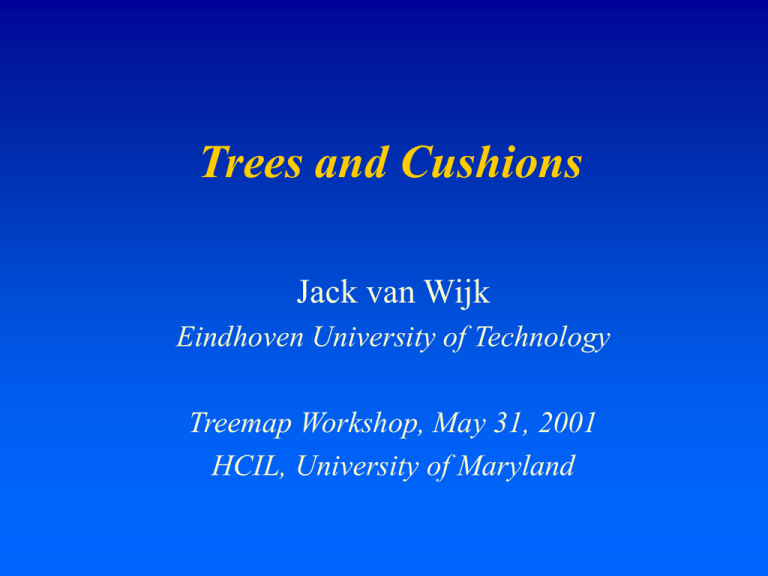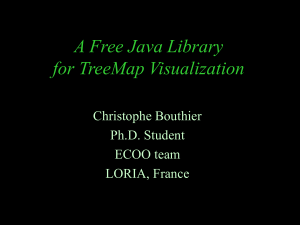Trees and Cushions Jack van Wijk Eindhoven University of Technology
advertisement

Trees and Cushions Jack van Wijk Eindhoven University of Technology Treemap Workshop, May 31, 2001 HCIL, University of Maryland InfoVis at Eindhoven Started 1998 Focus: • Trees and graphs • Large data sets • Use of computer graphics knowledge (textures, geometry, shading) to generate more effective visualizations Trees (T) and Cushions (C) T+C: Cushion treemaps (InfoVis’99) T+C: Squarified treemaps (Vissym’00) C: Voronoi diagrams (Vissym’01) C: Enridged contour maps (Vis’01) T: Botanical vis (InfoVis’01) What next? Cushion Treemaps Visualization of Hierarchical Information Jarke J. van Wijk Huub van de Wetering Eindhoven University of Technology IEEE InfoVis’99 Insight in structure of large trees Why is my disk full? What is our product portfolio? How is this university organized? Fuzzy questions: Visualization needed Treemap (Shneiderman, 1992) A16 G2 E1 H4 B3 C3 C3 D10 F2 I4 E1 F2 G2 I4 H4 Alternating directions, area represents size 1400 files 3060 employees How to emphasize structure? Color? Linewidth? Nesting? Shading? Use shaded geometric model! Ridges for more insight Binary tree Ridges Ridge + rotated ridge = cushion z = ax2 + bx + cy2 + dy + e + = Standard treemap Cushion Treemap H = 0.75 level H = 0.50 level Demo www.win.tue.nl/sequoiaview May 21 2001: 45,000 downloads Squarified Treemaps Mark Bruls Kees Huizing Jarke J. van Wijk Eindhoven University of Technology Vissym’00, Amsterdam Thin rectangles (small leaves high in hierarchy e.g., .cshrc) hard to compare sizes hard to point at waste of pixels inaccurate size How to avoid thin rectangles? drop the single direction layout (emphasize structure by other means) Squarification algorithm 1. Start placing recs in one row 2. stop when aspect ratio stops getting better 3. repeat with remaining area and recs Recursive per level (just like standard treemap algorithm) 6 6 Squarification algorithm 4 6 4 6 6 6 3 2 6 aspect ratio: 8/3 4/1 3/2 2 1 6 6 6 6 4 9/4 etc. 6 4 6 3 49/27 4 3 2 9/2 6 2 2 1 6 4 3 25/9 Result of squarification directory Squarified organization Shaded frames for structure Frames for structure no maze running for the viewer depth in structure as frame height “remote cousins” are visibly separated by indent Organization Directory structure Visualization of Generalized Voronoi Diagrams Alex Telea, Jarke van Wijk Vissym’01, Ascona Cushions Cushions help to understand hierarchical spatial tesselations of the plane How about cushions to visualize Generalized Voronoi Diagrams? Generalized Voronoi diagrams N=1 N=2 Polygon = area where N seeds are closest Cushions and bevels Cushions, bevels, color N= 3 Cushions, bevels, color Generalized Voronoi Diagrams Many other types (different distance measures) Applications Enridged Contour Maps Van Wijk & Telea, Vis’01, San Diego Given: Height field f(x,y) Required: • Qualitative (where are the ridges) and • Quantitative (how high is this peak) info Standard visualizations Enridged height field ... height(f(x, y)) linear mapping non-linear mapping f(x, y) Height field Soft, convex ridges Strong, convex ridges Soft,concave ridges Climate (January) Color: Temperature; Height: Precipitation Climate (July) Color: Temperature; Height: Precipitation Dense contours (equid. in space) With ridges... Hierarchical ridges Back to Trees: Botanical Visualization of Huge Hierarchies Ernst Kleiberg, Huub van de Wetering, Jarke van Wijk InfoVis’01, San Diego Idea Botanical trees are easy to understand, yet contain a lot of branches and leaves Can we use ideas from botanical modeling for InfoVis? Strand model (Holton, 1994) Mimics vascular system Each leaf is connected to one strand Branch = bundle of strands Rules define when a branch is split First try: Each directory is a branch Each file is a leaf Naive result... Three problems Continuing branches are hard to see Long, thin branches emerge Leaves are messy Smoothed continuing branches Contract long branches Files: Phi-balls (Lintermann,99) One big file Many small files Botanical modeling Compact, natural visualization Phyllotaxis = magic! Many treasures to be discovered Usability? Botanical treemaps? My treemap to-do list Non-rectangular shapes/subdivisions • circles, polygons? Multivariate data • color, texture? Applications • genealogy, data mining? Evaluation
